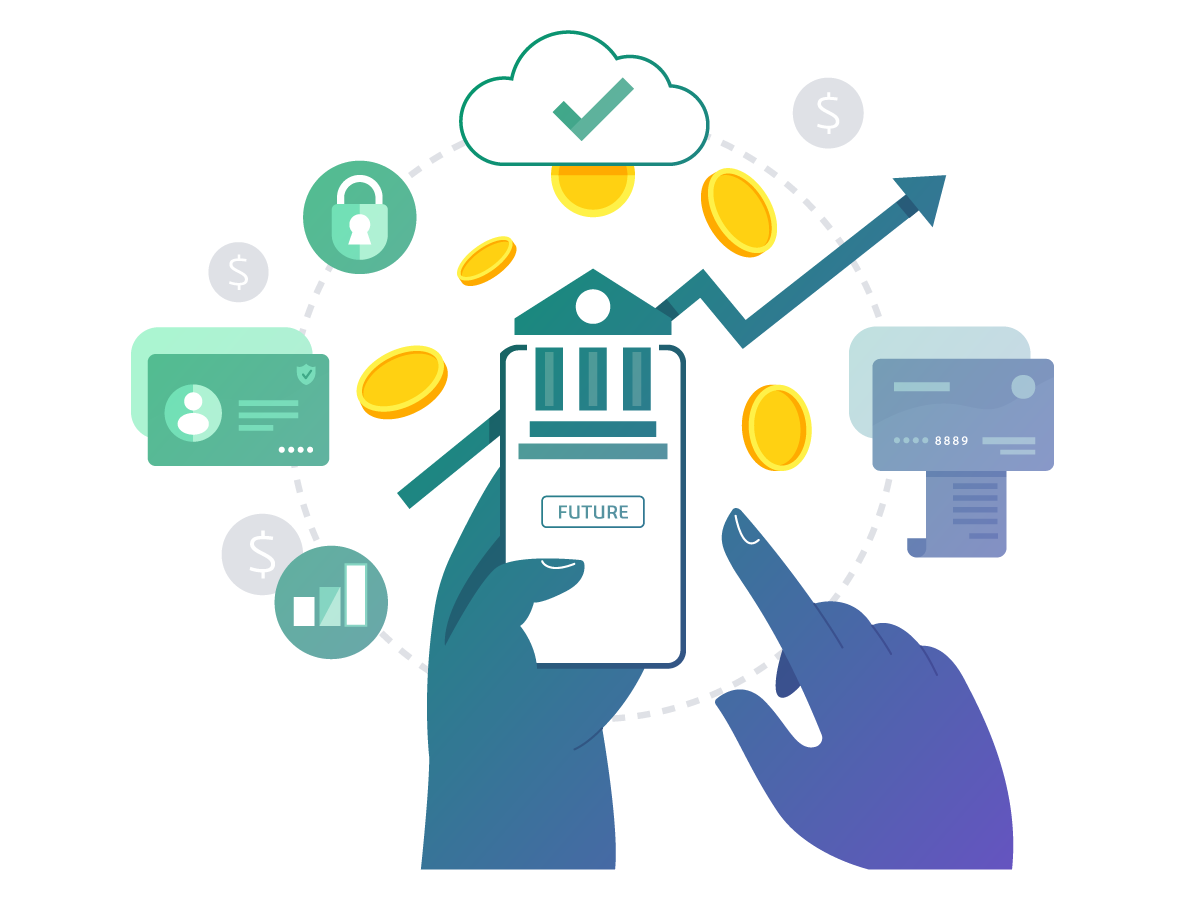The financial technology (fintech) sector is undergoing a significant transformation, integrating sustainability into its core operations. This shift, known as green fintech, is revolutionizing the way financial services approach environmental challenges.
Here, we explore the emerging trends, technologies, and innovations driving this change, and highlight key players in the green fintech market.

The Rise of Green Fintech: Sustainable Fintech Trends
Fintech firms are progressively creating offerings that highlight the significance of environmental sustainability. These encompass green loans, green bonds, and investment platforms centered on eco-friendly initiatives.
As per a recent market research report by Global Market Estimates, the global green fintech market is anticipated to expand at a CAGR of 22.4% between 2024 and 20291.
Below, we’ve described the fastest-growing trends we are seeing in green fintech.
Green Loans and Sustainable Finance
Financial services firms are now designing loan products that encourage businesses to prioritize sustainability. These green loans often come with benefits like reduced interest rates for investments in energy-efficient technologies and sustainable practices. Notable examples include HSBC’s Green Hub, Lloyds’ Clean Growth Financing Initiative, and Barclays’ Green Loan program2.
Digital Payments and Signatures
The adoption of digital payments and electronic signatures significantly reduces the environmental footprint associated with traditional banking practices. By minimizing the need for checks and paper statements, digital solutions are making banking more eco-friendly.
Green Investments
Global investments in green initiatives have surged, with total funding reaching $495 billion in 2022. Digital platforms and fintech companies are pivotal in facilitating these investments, making it easier for investors to support eco-friendly projects2.

Carbon Tracking and Offsetting
Carbon Tracking
Consumers increasingly demand tools to track the carbon footprint of their purchases. Recent findings from Tink indicate that 40% of individuals polled in the UK express a desire for their banks to provide resources aiding in the monitoring of their environmental footprint. However, only 24% of financial institutions presently provide such features.
This data underscores an opportunity for the financial sector to foster a more sustainable future by advocating for tools that facilitate customer comprehension, management, and mitigation of their carbon emissions3.
Mobile Payment Solutions for Carbon Offsetting
Mobile payment solutions now offer ways to offset carbon emissions from financial transactions by contributing to renewable energy projects and reforestation initiatives. These services are gaining popularity for their role in supporting environmental sustainability2.
Carbon-Neutral Payment Processing Methods
Payment processors are adopting carbon-neutral methods to offset their environmental impact. Companies like Switch2Zero are leading the way with solutions that support renewable energy projects and promote energy-efficient technologies2.

Innovative Payment Solutions
Contactless Payments for Sustainable Transportation
Contactless payments have revolutionized transactions, especially in public transportation, by reducing the need for cash and paper tickets. This technology simplifies payments and contributes to a more sustainable payment ecosystem.
Digital Wallets
Digital wallets decrease the need for physical credit and debit cards, thereby reducing plastic waste. By promoting electronic transactions, digital wallets play a crucial role in creating a sustainable financial environment.
The Power of Open Banking and AI
Open Banking
Open banking, driven by regulations like the EU’s PSD2, enhances transparency and competition in the financial sector. This interconnected ecosystem allows for more efficient financial services, promoting sustainability and customer control over finances.
AI-Driven Sustainable Investment Analysis
Artificial intelligence enables sophisticated analysis of sustainable investments, providing in-depth insights into the environmental and social impacts of investment decisions. This helps investors make informed choices that align with their sustainability goals4.

Embedded Green Finance
Transitioning to eco-friendliness is no longer just a trendy catchphrase for businesses; it has evolved into a distinct concept that is garnering increasing attention.
In 2021, the market value of green finance surged to $540.6 billion from just $5.2 billion in 2012, illustrating exponential market growth5. Embedded finance is becoming increasingly prevalent worldwide, with applications ranging from in-store transactions to insurance and vehicle financing.
Green embedded finance, in particular, involves offering discounted rates or favorable terms for purchasing eco-friendly products, in contrast to less environmentally conscious alternatives.
Embedded finance connects consumers and businesses with financial offerings through various channels, whether physical or digital:
- In-store: Brick-and-mortar establishments use in-person embedded finance to incentivize significant or recurring purchases, such as branded credit card offers at checkout.
- Online: Embedded finance integrates seamlessly into company websites and activates based on behavioral cues, like BNPL options during checkout.
- In-app: Branded applications, digital wallets, and social media platforms serve as platforms for embedded finance, providing access to budgeting and investment services.
The benefits of embedded finance are substantial, offering banks new revenue sources, lower customer acquisition costs, access to untapped customer segments, and enhanced conversion rates. BaaS providers also benefit by generating revenue through transaction fees, revenue-sharing agreements, and licensing fees.
Embedded finance is set to drive innovation and expand financial product offerings, fostering growth within the sector.

Embracing the Future of Payments with Virtual Cards
Virtual cards are gaining significant traction, with Juniper Research forecasting a substantial increase in their usage. The total volume of virtual card transactions is projected to soar from 36 billion in 2023 to 175 billion by 2028, reflecting a remarkable growth rate of 386% over five years6. Virtual prepaid cards offer an eco-friendly alternative to traditional plastic cards and promote sustainable financial practices.
The technology behind virtual cards is continuously evolving:
- Artificial Intelligence and Machine Learning: These technologies enable personalized financial management and fraud detection.
- Expanding Use Cases: Virtual cards are finding applications in virtual reality shopping and augmented reality experiences.
- Greater Customization and Control: Future virtual cards may offer users more personalized settings and controls.
Virtual prepaid cards cater to a wide range of users, including freelancers, digital natives, financial institutions, online retailers, healthcare providers, educational institutions, the travel and hospitality industry, public transit systems, BNPL platforms, and entertainment providers.
The future of virtual prepaid cards looks promising, with expectations for seamless integration with digital wallets, enhanced security features, peer-to-peer payments, integration with loyalty programs, blockchain and cryptocurrency integration, and broader applications in both B2B and B2C contexts.
As digital-native generations favor cashless transactions, virtual prepaid cards are set to become a convenient, secure, and adaptable payment alternative.

How Fintechs Benefit from ESG and Ethical Finance
What is ESG in Fintech?
Environmental, Social, and Governance (ESG) criteria are a set of standards for a company’s operations that socially conscious investors use to screen potential investments. In the fintech sector, ESG encompasses a range of practices and policies aimed at promoting sustainability, ethical behavior, and good governance. This includes everything from reducing carbon footprints and promoting financial inclusion to ensuring transparency and accountability in corporate governance.
Fintech companies integrate ESG principles into their operations and product offerings to attract investors who prioritize ethical and sustainable business practices. By adopting ESG criteria, fintechs can demonstrate their commitment to positive social and environmental impacts, thereby enhancing their appeal to a growing market of eco-conscious consumers and investors.
What are the Benefits?
- Attracting Investment: Fintech companies that adhere to ESG standards are more likely to attract investment from socially responsible investors and funds dedicated to sustainable development. This can open up new streams of capital, providing fintechs with the financial resources needed to innovate and expand.
- Enhancing Reputation: Implementing ESG practices helps fintech companies build a strong reputation for ethical and sustainable business practices. This can lead to increased customer loyalty, as consumers are becoming more conscious of the ethical implications of their financial decisions.
- Operational Efficiency: ESG initiatives often lead to operational improvements, such as increased energy efficiency and reduced waste, which can result in cost savings.
- Regulatory Compliance: As governments around the world introduce stricter regulations related to sustainability and corporate governance, fintechs that proactively adopt ESG practices are better positioned to comply with these regulations.
- Risk Management: Incorporating ESG factors into business strategies helps fintech companies identify and mitigate risks associated with environmental and social issues.
- Market Differentiation: In a crowded market, ESG can serve as a key differentiator for fintech companies. By offering products and services that align with ethical and sustainable values, fintechs can attract a niche segment of customers who prioritize ESG in their financial decisions.

Leading the Charge: Key Players in Green Fintech
Carbon Footprint Tracking:
Keewe
Keewe's Green Payments feature allows customers to assess the carbon footprint of their international transactions. This fintech firm aims to reduce the costs and environmental impact of SMEs engaged in international trade7.
Cogo and Personetics Partnership
Cogo and Personetics are collaborating to provide banks with tools to help customers monitor and manage their carbon emissions. This partnership aims to integrate sustainability into digital banking solutions, enhancing customer engagement and environmental impact8.
Carbon Footprint Tracking: Tred
Tred uses Open Banking to help consumers track, reduce, and offset their carbon footprint. Their green debit card integrates sustainability into everyday financial transactions9.

Environmental Investing: Iceberg Data Lab (IDL)
Iceberg Data Lab has introduced 'Barbatus', the world’s first ESG AI assistant, designed to simplify ESG data analysis and reporting. This innovative tool enhances clients' understanding of the environmental impact of their investments10.
Innovative Tokens: Sustain Exchange
Sustain Exchange’s platform, launched on Earth Day, uses EnAble Tokens to promote sustainable practices aligned with the UN Sustainable Development Goals. This innovative system fosters a community committed to responsible business practices11.
Ethical Consumerism: Karma Wallet
Karma Wallet's acquisition of DoneGood integrates ethical consumerism with financial services. The Karma Wallet Card supports sustainable actions by contributing to environmental and social causes with each transaction12.
Green Financing: CarbonChain
CarbonChain provides carbon accounting solutions to help industries tap into green financing opportunities by quantifying the carbon footprints of trade finance portfolios13.
Emission Data: Climate Choice
Climate Choice offers a climate intelligence platform that provides audit-ready risk and emission data, helping companies and suppliers in their decarbonization efforts14.
Recycled Cards: Allpay Cards
Allpay Cards has partnered with SPICA to produce high-performance recycled PVC materials, demonstrating a commitment to sustainability in card manufacturing15.

Green Technologies to Watch
Green Fintech is transforming the financial landscape by promoting economic growth while addressing urgent environmental challenges. This innovative field leverages advanced technologies such as blockchain, AI, and big data to create financial products and services that enhance environmental sustainability, reduce carbon emissions, and drive investments in eco-friendly projects.
Key technologies driving the development of sustainable financial solutions in Green Fintech include:
Blockchain
Known for its transparency and security, blockchain technology supports the creation of decentralized platforms for green investments, carbon trading, and the monitoring of environmental project impacts. In the carbon credit market, blockchain ensures transaction integrity by verifying and managing the carbon offsetting process.
Artificial Intelligence and Machine Learning
AI and machine learning algorithms analyze extensive datasets to optimize energy use, predict environmental hazards, and identify sustainable investment opportunities. These technologies enable financial institutions and investors to make informed decisions that align with sustainability goals.
Big Data
In green fintech, big data involves collecting and analyzing large datasets that include environmental, social, and governance (ESG) factors. This analysis provides insights into companies' sustainability performance, guiding investors toward responsible investment choices.
Green Fintech Trends on the Rise
Sustainable fintech trends for 2024 include green loans, digital payments, green investments, carbon tracking, mobile payment solutions for carbon offsetting, carbon-neutral payment processing, contactless payments for sustainable transportation, digital wallets, open banking, and AI-driven sustainable investment analysis.

The Outlook for Green Fintech
Despite challenges such as regulatory complexities, ESG metric standardization, and greenwashing risks, the outlook for Green Fintech is promising. Growing regulatory support and technological advancements suggest substantial expansion.
The sector's evolution depends on continuous innovation, driving the development of new financial offerings that support the transition to a low-carbon, sustainable economy.
As consumer awareness and preference for eco-friendly solutions rise, Green Fintech is poised to play a crucial role in reshaping the financial sector to address modern environmental challenges.
Sustainability-Focused Fintech
Green fintech firms are gaining traction, securing significant investments despite a general decline in venture capital funding in the fintech sector. These startups focus on areas like carbon markets, energy management, and carbon accounting, positioning themselves as leaders in the fight against climate change.
CEO Insights on Sustainability
A KPMG survey reveals that US corporate leaders remain optimistic about the financial returns on their sustainability investments. CEOs are integrating sustainability into their core business strategies, leveraging data and AI to drive impactful initiatives16.
Investments in Green Fintech
According to Finextra Research, these startups, which concentrate on innovative solutions like carbon markets, energy management, and carbon accounting, among others, have successfully navigated the venture capital landscape, securing an impressive $2.3 billion in investments across the US and Europe17.
Green FinTech startups are at the forefront of tackling pressing environmental challenges through technological innovation. They specialize in various domains, including carbon markets, energy management, carbon accounting, ESG (Environmental, Social, and Governance) reporting, natural capital, climate risk management, and supply chain analytics.
Final Word: The Future is Green
The transition from traditional fintech to green fintech is not just a trend but a necessary evolution to address global environmental challenges. As fintech firms continue to innovate and integrate sustainability into their operations, they pave the way for a greener, more sustainable financial future.
The promising growth of the green fintech market highlights the sector's potential to drive significant environmental and economic benefits, making it a critical component of the modern financial landscape.
















